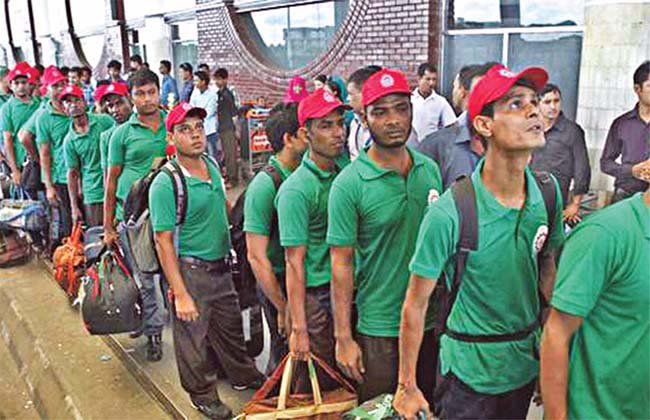
With corona situation improving in recent days in Bangladesh, Dhaka should constantly engage in talks with Gulf countries, Singapore and Malaysia at the top level to regain overseas manpower market.
In February with the rate of infection dropped to less than 3.00 per cent, according to the available information.
As COVId-19 has hit hard the export of manpower to different countries in 2020, Bangladesh should start extensive dialogues with the Kingdom of Saudi Arabia, Qatar, Kuwait, Oman, Bahrain, Jordan, UAE, Malaysia, Singapore and Japan to regain and expand labour markets in 2021, said Bangladesh Association of International Recruiting Agencies (BAIRA) leaders, policy-makers, economists.
According to sources, a total of 35,732 workers, 49, 552 and 61,653 workers got job respectively in January, February and March in different overseas markets.
Manpower export started picking since last December with the country sending a total of 175,293 workers during December–March period, according to Bureau of Manpower, Employment and Training (BMET).
Bangladesh exported a total of 217,669 workers to overseas countries during the January-December period of the last calendar year as corona-virus hit the labour market global market.
The manpower export of Bangladesh dropped by over 69 per cent in 2020 as against 2019, according to statistics of the Bureau of Manpower Employment and Training (BMET) against the backdrop of outbreak of COVID-19 across the world, political tension in the middle-eastern countries, budget cut in mega-projects, economic slowdown and policy of recruiting local manpower in the oil-producing countries.
Thousands of Bangladeshis lost their jobs as the countries in the Middle East have halted a number of development projects amid dip in oil prices and spread of coronavirus across the world.
Bangladesh exported a total of 700,159 workers in 2019, 734,181 workers in 2018, 10,08,525 workers in 2017 and 757,731 workers in 2016 to different countries
A total of 146,895 Bangladeshi workers got job in different countries during the January–March period of the current calendar year.
As the manpower export plummeted in 2020, the government should also plan to send more skilled workers abroad in 2021 since some closed labour markets are expected to reopen next year, according to the Bangladesh Association of International Recruiting Agencies (BAIRA) leader.
Bangladesh had exported a total of 10,57,056 skilled and unskilled workers to the Southeast Asian country during 1976–2019 period, according to Bureau of Manpower, Employment and Training (BMET).
Bangladesh had exported a total of 10,57,056 skilled and unskilled workers to the Southeast Asian country during 1976–2019 period, according to Bureau of Manpower, Employment and Training (BMET).
Though three months of the current calendar year passed, Malaysia has not opened its market to Bangladeshi workers. Malaysia has virtually stopped recruitment of Bangladeshi workers since 2019 citing various reasons, sources said.
Sources said political stress between Dhaka and Kuala Lumpur, high number of irregular Bangladeshi migrants, unethical practice of some manpower agents and high migration costs stand in the way of resuming manpower export to Malaysia.
Though the Bangladesh mission in Kuala Lumpur has no reliable statistics on undocumented Bangladeshis living in Malaysia, some 200,000-300,000 Bangladeshis are undocumented, sources said………….
Meanwhile, Malaysian Human Resources Minister M Saravanan in Petaling Jaya recently slammed the Bangladesh High Commission for launching an employment job portal called “Chakrir Khoj”.
Saravanan said it was inappropriate to launch the job portal in Malaysia as it undermined the government’s plan to properly manage the demand for foreign labour in the country.
“I am shocked by the action of the Bangladesh High Commission over its launch of ‘Chakrir Khoj’ without prior consultation or notification to the human resources ministry. Such action goes against the role and responsibility of a foreign diplomatic mission,” he said.
The employment portal is to enable Malaysian employers to recruit Bangladeshi workers, as well as to assist undocumented Bangladeshi workers to participate in the government’s Recalibration Programme that was announced last year.
The introduction of the Recalibration Programme allows the construction, manufacturing, plantation and agricultural sectors to legally employ undocumented workers until June 30.
Saravanan said the government had developed a national employment portal called MyFutureJobs which advertised domestic job vacancies that also catered to foreign workers as well as expatriates.
He added that “Chakrir Khoj” would jeopardise the business of more than 400 private employment agencies currently licensed by the labour department to bring foreign workers into the country.
“I view this matter seriously as it can mislead and create confusion, particularly among local employers. Under the Private Employment Agencies Act 1981 (Act 246), the recruitment of foreign workers in Malaysia is to be managed by private employment agencies licensed by the department of labour.
“These local companies have been out of business for over a year but are still paying the required licence fee,” he said.
Saravanan also said the employment portal might cause an influx of illegal Bangladeshi workers to the country which could lead to exploitation due to the uncertainty of their immigration status. It could then mar Malaysia’s image, he added.
“As much as I acknowledge the industry’s dependence on foreign workers, especially in sectors that are deemed unattractive to local workers, the ministry has always remained steadfast in ensuring that local workers are given priority to fill the job vacancies,” he said.
Saravanan added he was currently engaging with employers from sectors that were badly affected during the Covid-19 pandemic, namely construction, plantation and agriculture, to advertise their vacancies on the MyFutureJobs portal to ensure no local workers were deprived of the opportunity to secure employment.
Meanwhile, Dhaka should engage in constant dialogue at the top level with Kuala Lumpur over regularizing undocumented Bangladeshis in Malaysia, sources said.
Sources said political stress between Dhaka and Kuala Lumpur, high number of irregular Bangladeshi migrants, unethical practice of some manpower agents and high migration costs stand in the way of resuming manpower export to Malaysia .
Malaysia has virtually stopped recruitment of Bangladeshi workers since 2019 citing various reasons, sources said.
Though the Bangladesh mission in Kuala Lumpur has no reliable statistics on undocumented Bangladeshis living in Malaysia, some 200,000-300,000 Bangladeshis are undocumented, sources said
According to available sources said, Malaysian economy is set to waive impact of CoCOD-19 and like to post 4-5 per cent growth this year .
As the manpower export plummeted in 2020, the government should also devise mid and long term strategy to send more skilled workers abroad in 2021 since some closed labour markets are expected to reopen this year, the leader added.
SM Zillur Rahman, a former director of Dhaka Chamber and Chamber and Industry (DCCI), while talking to the daily expressed hope that manpower export is set to revive this year with the beginning of the vaccination.
Zillur Rahman, also chairman of Rahman Group, said the government should have a drastic plan to recover the manpower from this year.
According to available sources said, Malaysian economy is set to waive impact of CoCOD-19 and like to post 4-5 per cent growth this year .
As the manpower export plummeted in 2020, the government should also devise mid and long term strategy to send more skilled workers abroad in 2021 since some closed labour markets are expected to reopen this year, the leader added.
Bangladesh exported a total of 700,159 workers in 2019, a total of 734,181 and a total of 1008,525 workers in 2017.
SM Zillur Rahman, former director of Dhaka Chamber and Chamber and Industry (DCCI), while talking to the daily expressed hope that manpower export is set to revive this year with the beginning of the vaccination. Quoting public health experts, he has expressed the views Bangladesh will have to vaccine 75-80 per cent of its total population as a step to combat the disease.
Zillur Rahman, also chairman of Rahman Group, said the government should have a drastic plan to recover the manpower from this year.
SM Zillur Rahman has opined that Bangladesh should start effective negotiation with countries like Malaysia, UAE, the Maldives and Kuwait at the top level to reopen the labour market.
Meanwhile, Malaysia’s central bank said it expects the economy to return to pre-Covid levels by the middle of this year, and pledged to keep monetary policy accommodative as the country charts a recovery from the pandemic.
Gross domestic product may expand 6% to 7.5% in 2021, Malaysia’s central bank said Wednesday in its annual Economic and Monetary Review. That’s a tad slower than its earlier projection of 6.5%-7.5% growth.
The writer is a Special Correspondent of The News Today

